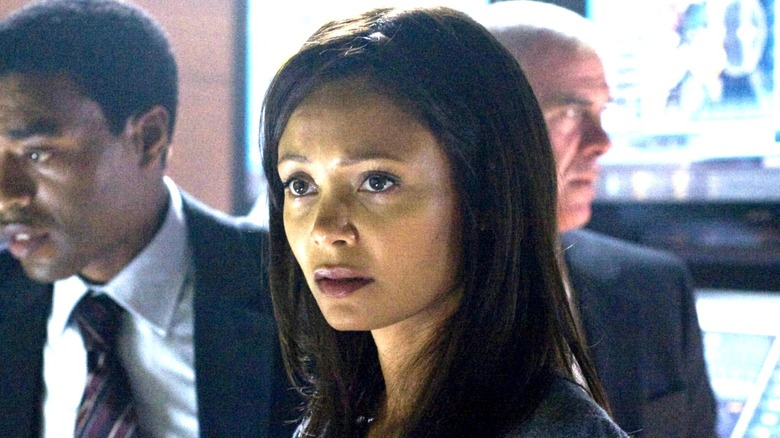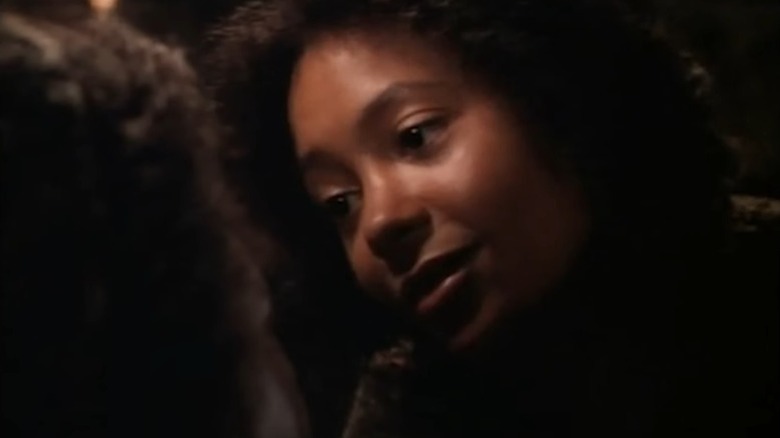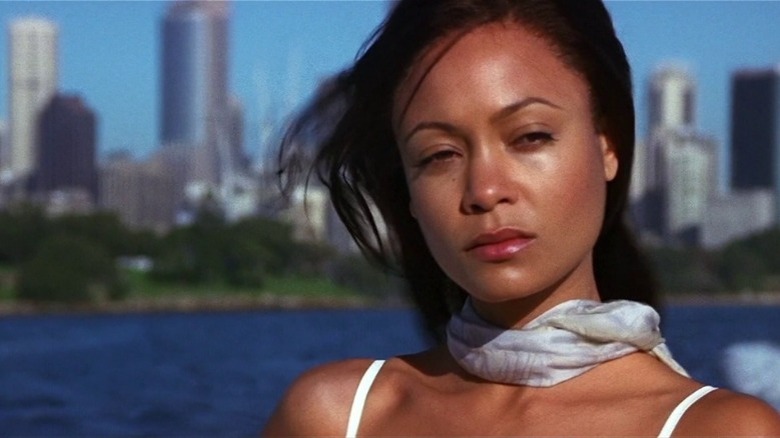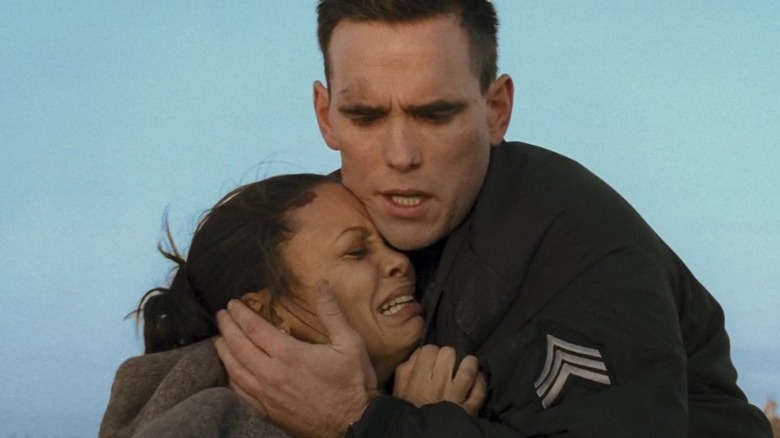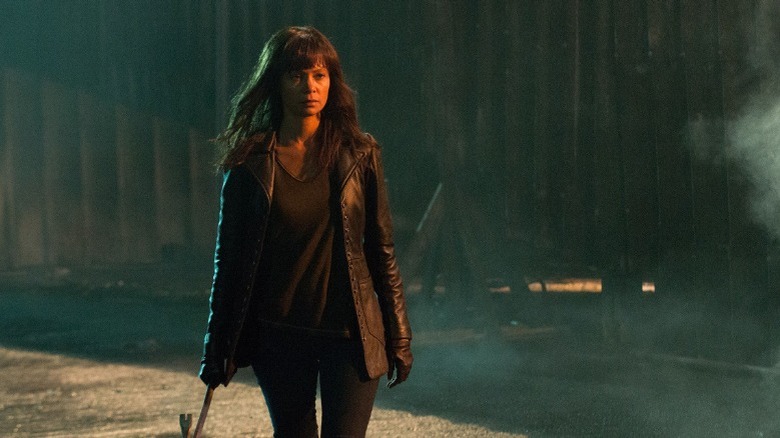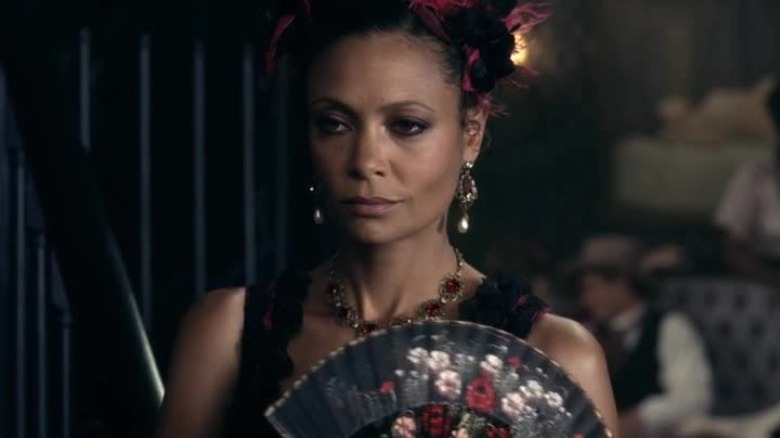Why Laura From 2012 Looks So Familiar
Roland Emmerich's "2012," now streaming on Netflix, was a unique cultural event in many ways. The first film ever to cross $700 million at the international box office without making it past $200 million domestically (via Forbes), it captivated audiences worldwide thanks to an unusually collectivist approach to disaster movie thrills, with a wide ensemble of characters going off on concurrent pre-apocalyptic sagas around the globe.
The 2009 film's commitment to the concept of visualizing what an end-of-the-world-grade event might look like in our contemporary social and political landscape extended to the character of Laura Wilson, U.S. First Daughter and art expert, who's tasked with helping save mankind's most important treasures. Under Laura's guidance, works such as the Mona Lisa are moved to arks in the Himalayas in 2011, in advance of the following year's predicted geological cataclysm, so that human history may be preserved despite the 2012 phenomenon.
Thandiwe Newton, the actress who plays Laura, was already a big star in 2009, but has become even more visible, popular, and respected since. Here are a few of the places where you might have seen her before.
Thandiwe Newton broke through as the title character in Beloved
English-Zimbabwean actress Thandiwe Newton went by "Thandie" for most of her career, after her name was misspelled as such in her first acting credit (via Vogue); it's also how she was billed for "2012." Hollywood's bungling of Newton's birth name becomes especially unfortunate when you consider the fact that "Thandiwe" means "beloved" in the Zulu, Ndebele and Xhosa languages (via The Guardian) — "Beloved," incidentally, being the very name of the actress' first high-profile movie role.
Following several supporting roles and indie projects throughout the 1990s, the title role in "Beloved," Jonathan Demme's 1998 adaptation of the seminal Toni Morrison novel, gave Newton an opportunity to showcase her rarefied skills as a performer. Her eerie, scary, wickedly humorous turn as the reincarnated daughter of protagonist Sethe (Oprah Winfrey) immediately marked her down as a talent to look out for. And, though the film was a box office bomb at the time, Newton's work is among the elements that have made it a unique, underrated gem due for a reappraisal in the eyes of many Demme and Morrison fans.
She earned mainstream visibility with Mission: Impossible 2
Back in 2000, a long ways away from its consolidation as the 21st century's defining action franchise, "Mission: Impossible" was "merely" a hit Tom Cruise spy movie getting a sequel. The John Woo-directed "Mission: Impossible 2" was even bigger and more successful than the first one, and helped send the series on its rising path to world domination.
Much like the first installment, "M:I 2" places IMF agent Ethan Hunt at the center of a dense international conspiracy, as humanity is threatened by the emergence of a genetically engineered virus known as Chimera. To help him recover the virus and its cure from rogue agent Sean Ambrose (Dougray Scott), Ethan recruits Nyah Nordoff-Hall, a highly skilled professional thief, brought to life by Thandiwe Newton in a charismatic, star-making turn.
Newton collected several accolades for the role, including a Blockbuster Entertainment Award nomination for Favorite Female Newcomer and a NAACP Image Award nomination for Outstanding Supporting Actress in a Motion Picture. But the reception to her performance was seemingly polarized: She also received a Razzie nomination for Worst Supporting Actress (via IMDb).
She received widespread acclaim and multiple awards for Crash
Paul Haggis' "Crash" is best-remembered as one of the most questionable Best Picture Oscar winners ever, with critics routinely lambasting it for its bloated, hamfisted dramatics and shallow understanding of racial tensions in the U.S. But the fact remains that, in 2005, it moved enough viewers to top the Academy's polling. And that success can largely be attributed to the strength of its actors, who manage to carry the film even when the script fails it, with Thandiwe Newton's performance as arguably the biggest example.
On paper, Newton's character is a rather thankless one: Christine Thayer, wife of TV producer Cameron Thayer (Terrence Howard), whose role in the movie's intricate tapestry comes down to being molested by racist LAPD officer John Ryan (Matt Dillon) during an arbitrary stop, berating her husband for not defending her, coming around to the fact that he did it for their own safety, and then being ironically saved by Ryan from the wreckage of a car accident in the film's infamous climax. Critics, including Newton herself (via Vulture), have taken the movie to task for its handling of Christine, who is more of a device for the spectacularization of racial anxiety than a proper character. But Newton's performance in the role is so vivid and convincing — including her abject horror and confusion at being rescued by Ryan, mirroring the audience's own likely reaction — that she makes her scenes deeply moving in spite of themselves. Not for nothing, she was showered with praise and awards, including a BAFTA for Best Supporting Actress (via IMDb).
She had an awful experience as the lead in cop drama Rogue
The years after "Crash" saw Thandiwe Newton give a string of strong supporting turns in movies that weren't quite up to the standard of her talent, including "Norbit," "Run Fatboy Run," and "W" (per IMDb). She also struck up a partnership with Tyler Perry, starring in his dramas "For Colored Girls" and "Good Deeds," and had a recurring role on "ER" as Kem Nikasu, the love interest of Dr. John Carter (Noah Wyle).
Her most visible project in this period, however, was probably the Audience police drama series "Rogue," in which she starred as San Jose cop Grace Travis. True to the show's title, Grace was a staunchly devoted officer whose commitment to her undercover assignments took a major toll on her personal life. The show was a significant hit for Audience, running for four seasons.
But, even though it was Newton's first leading TV role, she has not minced words when discussing the job's traumatic aspects. As she told Vulture, the show's producers pressured her, and eventually tricked her, into doing a topless sex scene for ratings. Adding insult to injury, they also ignored her pleas for more Black people to be added to the cast, leaving her as the "token" Black actor even though "Rogue" was set in Oakland. And when she managed to break free from her contract and leave on Season 3, the show killed off her character in the most demeaning possible way. Newton called the whole thing "hideous," lamenting the "two years of hard work" she put into a production that had so little regard for her.
She finally got the role we'd all been waiting for on Westworld
For the better part of two decades, Newton's career was largely defined by the disparity between her acting prowess and the shoddiness of the projects she got to use it in. Fans of her work spent years and years waiting for a role that would allow her to explore the full breadth of her abilities, and it finally came in 2016, when she was cast as Maeve Millay on HBO's "Westworld."
Even though the first season of "Westworld" was centered around the park's co-founder Robert Ford (Anthony Hopkins) and its oldest host Dolores Abernathy (Evan Rachel Wood), the breakout star of the season was undoubtedly Newton as Maeve. The madam of the Mariposa, the central saloon in the town of Sweetwater where guests went looking for sex and refreshments, Maeve was already a scene-stealer even while fulfilling her programmed storyline, thanks to her take-no-prisoners attitude and irresistible snarky charm. Then, as the season progressed and she awakened to suppressed memories of her daughter in a previous storyline, Maeve became "Westworld'"s unlikely driving force, using her intelligence to defy her programming and write herself a new fate — an arc that continued throughout the following seasons.
Critics and audiences alike were awestruck by Maeve's story and Newton's tour-de-force performance, which finally crystalized her as the superstar she'd long deserved to be. Her eventual Emmy win for Outstanding Supporting Actress in a Drama Series (via IMDb) was just icing on the cake; by then, Newton had already established Maeve as one of the defining TV characters of the 2010s.
